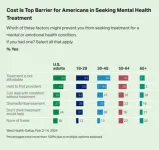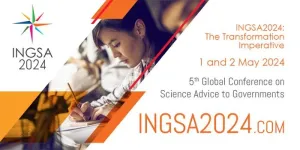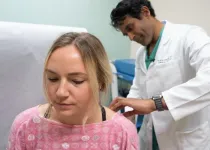(Press-News.org) SPOKANE, Wash. – Despite ChatGPT’s reported ability to pass medical exams, new research indicates it would be unwise to rely on it for some health assessments, such as whether a patient with chest pain needs to be hospitalized.
In a study involving thousands of simulated cases of patients with chest pain, ChatGPT provided inconsistent conclusions, returning different heart risk assessment levels for the exact same patient data. The generative AI system also failed to match the traditional methods physicians use to judge a patient’s cardiac risk. The findings were published in the journal PLOS ONE.
“ChatGPT was not acting in a consistent manner,” said lead author Dr. Thomas Heston, a researcher with Washington State University’s Elson S. Floyd College of Medicine. “Given the exact same data, ChatGPT would give a score of low risk, then next time an intermediate risk, and occasionally, it would go as far as giving a high risk.”
The authors believe the problem is likely due to the level of randomness built into the current version of the software, ChatGPT4, which helps it vary its responses to simulate natural language. This same randomness, however, does not work well for healthcare uses that require a single, consistent answer, Heston said.
“We found there was a lot of variation, and that variation in approach can be dangerous,” he said. “It can be a useful tool, but I think the technology is going a lot faster than our understanding of it, so it's critically important that we do a lot of research, especially in these high-stakes clinical situations.”
Chest pains are common complaints in emergency rooms, requiring doctors to rapidly assess the urgency of a patient’s condition. Some very serious cases are easy to identify by their symptoms, but lower risk ones can be trickier, Heston said, especially when determining whether someone should be hospitalized for observation or sent home and receive outpatient care.
Currently medical professionals often use one of two measures that go by the acronyms TIMI and HEART to assess heart risk. Heston likened these scales to calculators with each using a handful of variables including symptoms, health history and age. In contrast, an AI neural network like ChatGPT can assess billions of variables quickly, meaning it could potentially analyze a complex situation faster and more thoroughly.
For this study, Heston and colleague Dr. Lawrence Lewis of Washington University in St. Louis first generated three datasets of 10,000 randomized, simulated cases each. One dataset had the seven variables of the TIMI scale, the second set included the five HEART scale variables and a third had 44 randomized health variables. On the first two datasets, ChatGPT gave a different risk assessment 45% to 48% of the time on individual cases than a fixed TIMI or HEART score. For the last data set, the researchers ran the cases four times and found ChatGPT often did not agree with itself, returning different assessment levels for the same cases 44% of the time.
Despite the negative findings of this study, Heston sees great potential for generative AI in health care – with further development. For instance, assuming privacy standards could be met, entire medical records could be loaded into the program, and an in an emergency setting, a doctor could ask ChatGPT to give the most pertinent facts about a patient quickly. Also, for difficult, complex cases, doctors could ask the program to generate several possible diagnoses.
“ChatGPT could be excellent at creating a differential diagnosis and that's probably one of its greatest strengths,” said Heston. “If you don’t quite know what's going on with a patient, you could ask it to give the top five diagnoses and the reasoning behind each one. So it could be good at helping you think through a problem, but it’s not good at giving the answer.”
END
ChatGPT fails at heart risk assessment
2024-05-01
ELSE PRESS RELEASES FROM THIS DATE:
Improved AI process could better predict water supplies
2024-05-01
PULLMAN, Wash. -- A new computer model uses a better artificial intelligence process to measure snow and water availability more accurately across vast distances in the West, information that could someday be used to better predict water availability for farmers and others.
Publishing in the Proceedings of the AAAI Conference on Artificial Intelligence, the interdisciplinary group of Washington State University researchers predict water availability from areas in the West where snow amounts aren’t being physically measured.
Comparing ...
A blood test for stroke risk? Study finds network of inflammatory molecules may act as biomarker for risk of future cerebrovascular disease
2024-05-01
A simple blood test could allow doctors to determine whether a person may be at higher risk for stroke or cognitive decline during their lifetime, according to a new UCLA Health study.
The study, published in the journal Stroke, found that measuring concentrations of a network of inflammatory molecules in the blood could allow doctors to calculate a risk score for susceptibility for cerebral small vessel disease – a common cause of stroke and a contributor to cognitive decline found especially among the elderly.
Currently, the only way to determine a person’s risk for cerebral vascular diseases has been ...
New survey finds 75% of Americans feel mental health takes back seat to physical health within U.S. healthcare system
2024-05-01
WASHINGTON, DC – May 1, 2024 – Three-quarters of Americans feel mental health conditions are identified and treated much worse than physical health issues within the U.S. healthcare system, even as more than 80% perceive a dramatic rise in prevalence of mental health issues in the last five years, according to a new survey from West Health and Gallup released at the start of Mental Health Awareness Month and Older Americans Month.
Nearly identical percentages believe mental health is handled either “much” (38%) or “somewhat” worse (37%) than physical health ailments, while 15% say they are dealt with “about the same.” ...
Brief anger may impair blood vessel function
2024-05-01
Research Highlights:
When adults became angry after remembering past experiences, the function of cells lining the blood vessels was negatively impaired, which may restrict blood flow. Previous research has found that this may increase the risk of heart disease and stroke.
In this study, episodes of anxiety and sadness did not trigger the same change in functioning of the blood vessel lining.
Embargoed until 4 a.m. CT/5 a.m. ET Wed., May 1, 2024
DALLAS, May 1, 2024 — A brief episode of anger triggered by remembering past experiences may negatively impact the blood vessels’ ability to relax, which is essential ...
Science advisors unite in a call for greater variety of evidence in developing policy
2024-05-01
What? 5th International Conference on Governmental Science Advice, INGSA2024, marking the 10th Anniversary of the creation of the International Network for Governmental Science Advice (INGSA) & first meeting held in the global south.
Where? Kigali Convention Center, Rwanda: https://www.ingsa2024.com/
When? 1 – 2 May, 2024.
Context: One of the largest independent gatherings of thought- and practice-leaders in governmental science advice, research funding, multi-lateral institutions, academia, science communication and diplomacy is ...
New Japanese lily species identified, 1st addition to sukashiyuri group in 110 years
2024-05-01
A new species of the Japanese lily known as sukashiyuri has been identified for the first time since 1914 by a research team led by Dr. Seita Watanabe, a specially appointed assistant professor at the Botanical Gardens and the Graduate School of Science at Osaka Metropolitan University.
Dr. Watanabe questioned the classification used up to now for sukashiyuri group, which usually has orange flowers. These lilies have high ornamental value, having been exported from Japan for more than two centuries. There have been only four taxonomic groups, but Dr. Watanabe and his team sought evidence to prove that there were ...
The popular kids in school may be sleeping less
2024-05-01
Due to a later melatonin onset and increased alertness in the evening, teenagers often find it hard to fall asleep at a time that would allow them to clock up the recommended eight to 10 hours of sleep each night.
It is also during teenage years when increasing school demands, activities, more independence from parents, and relationships with peers begin to compete with sleep. The role of social context, however, is often overlooked when studying adolescents’ sleep. Now, researchers in Sweden and Australia wanted to find out how popularity ...
Patients with rheumatoid arthritis have unique and complex autoantibody patterns
2024-05-01
Patients with rheumatoid arthritis (RA) all have a unique and diverse set of antibodies that are involved in the development of the disease. Researchers at Utrecht University unveiled the complexity of these antibodies using powerful lab tools capable of analysing our immune system at molecular levels. Their discovery suggests that current assumptions about the origin of RA are too simple. Still, their findings may point towards improved diagnostics.
Rheumatoid arthritis is a chronic autoimmune disease that primarily affects the joints, causing pain, stiffness, and swelling. It arises when the immune system mistakenly attacks the body’s own tissues, leading ...
Keck Hospital of USC earns an ‘A’ hospital safety grade from The Leapfrog Group
2024-05-01
LOS ANGELES — Keck Hospital of USC earned an “A” Hospital Safety Grade from The Leapfrog Group, an independent national watchdog organization.
“This grade puts Keck Hospital among the safest in the nation, and is a testament to the hospital’s commitment to the highest standards of quality and safety protocols,” said Marty Sargeant, MBA, CEO of Keck Medical Center of USC.
The Leapfrog Group assigns an “A,” “B,” “C,” “D” or “F” grade to general hospitals across the country based on over 30 measures of errors, accidents, injuries and infections and the ...
Survey finds young adults more likely to believe myths about sun protection and skin cancer prevention
2024-05-01
Orlando, Fla - A new national survey by the Orlando Health Cancer Institute finds nearly a third (32%) of Americans agree that a tan makes people look better and healthier, a dangerous beauty standard that experts say can lead to risky behavior when it comes to sun exposure.
“There is no such thing as a healthy tan, as it’s really just a visual manifestation of damage to the skin,” said Rajesh Nair, MD, an oncology surgeon at the Orlando Health Cancer Institute. “But we’re fighting against a perceived positive image and health benefits of something that actually has a totally opposite reality, which ...





